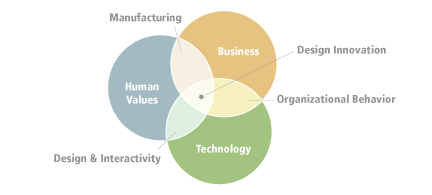« Akash K: Aesthetic Minimalist? | Back to Home | Steve vs. Bill »
January 29, 2005 The Business of Design
 I've always been interested in building things. I love to create products that make it easier for people to pursue their passions, communicate with each other, and learn more about the world. As a result, I also spend a lot of my time thinking about the systems and practices for building products. While I was at Stanford for my undergraduate work, I had the honor of having David Kelley as one of my three advisors. David Kelley used to juggle running IDEO on top of teaching and advising at Stanford. Recently he has stepped down as the head of IDEO and is working on a new project called the d.school. The d.school is a center for design at Stanford University with the mission to "advance interdisciplinary research and teaching, place Stanford at the epicenter of the design field, and strengthen the connection between the university and industry." The d.school has gotten a fair amount of press coverage, including this lengthier Business Week article. The implicit message here is that a center like this is what you need if you want to create products that make the world a better place.
I've always been interested in building things. I love to create products that make it easier for people to pursue their passions, communicate with each other, and learn more about the world. As a result, I also spend a lot of my time thinking about the systems and practices for building products. While I was at Stanford for my undergraduate work, I had the honor of having David Kelley as one of my three advisors. David Kelley used to juggle running IDEO on top of teaching and advising at Stanford. Recently he has stepped down as the head of IDEO and is working on a new project called the d.school. The d.school is a center for design at Stanford University with the mission to "advance interdisciplinary research and teaching, place Stanford at the epicenter of the design field, and strengthen the connection between the university and industry." The d.school has gotten a fair amount of press coverage, including this lengthier Business Week article. The implicit message here is that a center like this is what you need if you want to create products that make the world a better place.
I went to a d.school open house on June 9th 2004. While at the mixer I saw a Venn diagram which I have tried to replicate here (my apologies to David Kelley and George Kembel if the replication is flawed):

The idea is that design innovation is the link that combines the world of business, technology and human values. It also creates a framework to build a curriculum around design innovation. While I was at Stanford I took classes in Computer Science (Technology), Mechanical Engineering (Technology), Human-Computer Interaction (Design & Interactivity), Psychology (Human Values), Sociology (Human Values), and Art (Human Values). I didn't get a formal education in Manufacturing, Business and Organizational Behavior. I've always felt this has limited my ability to get things done in the corporate environment. Design discussions frequently spill over in to marketing issues, and the whole process of building a product is driven by organizational behavior. Because my background is in technology and human values, I typically don't get a seat at the table when business issues are being decided.
Motivated by the d.school meeting, I wanted to learn more about business. One way to do this is to apply to business school, but even the top general business schools (Stanford and Harvard) don't really teach in an interdisciplinary way.
Stanford is ahead of Harvard, but until the d.school is fully geared up, the GSB at Stanford is still a bit of a silo. So is the MBA route worthwhile?
I was talking to Max Levchin about this and he asked me a very important question: of the entrepreneurs that you respect, how many of them have an MBA? I started to go through the names of people that I look up to: Steve Jobs, David Kelley, Bill Gates, Larry Page, Sergey Brin, Walter Hewlett, David Packard, John Warnock, Chuck Geschke... None of them have an MBA. The other unifying factor is that they all started their own company.
So what does this mean for me? Do I apply to the d.school in 2007/2008? Do I start my own company? Do I start a mini company within a larger corporation?
Posted by johnnie at January 29, 2005 12:47 PM
Comments
Here's what I meant about a mini-company within a company:
At Adobe you can put together a proposal for a new product or business venture and then shop that around. Leslie Bixel, head of Idea Studio, and Greg Gilley, one of the heads of the Office of Technology, would be two good people to start with. If it gets traction you can work your way up the ladder and pitch to Shantanu or Bruce.
I thought about doing this but decided against it. The reason is that Adobe is still feels sort of risk averse compared to Google or a venture firm. Another reason I decided against it was that starting a mini-company within Adobe has two big limitations: 1. You get no serious equity stake in the company, which means that you've basically thrown out the authentic start-up culture. 2. You have to, very quickly, rationalize your work within the overall corporate strategy. #2 doesn't sound like a big deal, but when you're in an exploration phase, having to justify your experiment against the overall digital imaging strategy can be overkill. Imagine if Woz had stayed at Atari while trying to build the Apple computer. It would've been gobbled up and rolled in to some larger corporate initiative.
So what did I decide to do? I will be revealing that shortly.
Posted by: Johnnie Manzari ![[TypeKey Profile Page]](http://www.johnniemanzari.com/nav-commenters.gif) at February 13, 2005 10:01 AM
at February 13, 2005 10:01 AM


